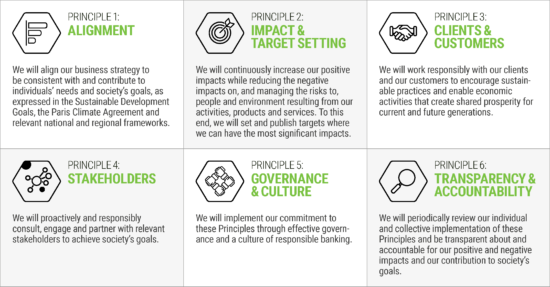September 23, 2019 – At a meeting this week at the United Nations, there is a call for countries to put their money where there mouth has been when it comes to acting and spending meaningfully to deal with adaptation and mitigation climate change efforts. The non-binding Paris Climate Agreement of 2015 has relied on the honour and word of nations with no compulsion to address climate change. And as expected, many of the signatories to the Agreement have done little more than pay lip service to it.
What is equally troubling is the revelation that in a coalition of 130 global financial firms, a mere two of the world’s top-10 banks has signed on to a United Nations declaration regarding responsible banking. The two are Citigroup and the Industrial and Commercial Bank of China.
The responsible banking declaration states that companies begin to do self-assessment regarding sustainability practices. You would think that this isn’t a lot to ask, yet JP Morgan Chase, Bank of America, Morgan Stanley, Goldman Sachs, Wells Fargo, and others from the top 10 have not joined. The declaration asks asking banks over a four-year period to look at all aspects of their business through a sustainability lens. The initiative launched yesterday with a ceremony planned for today in New York in which 45 banking and financial CEOs will join with the Secretary-General of the United Nations in a public announcement.
There are six principles defining the declaration including:
Those signatories to the declaration have been asked to publish a self-assessment within 18 months and annually thereafter showing they have implemented the following:
- An impact analysis that identifies positive and negative impacts on society, the economy, and the environment where the financial institution operates.
- Set and publish a minimum of two target areas in their practices to align with the sustainability principles of the declaration and follow that with the creation of milestones and target dates to monitor progress.
- Provide a self-assessment progress report every two years and publish it making it available to the public.
Among the founding institutions creating the principles and measurable reporting by which member banks will self-assess are:
- Access
- Arab African International Bank
- Banco Pichincha
- Groupo Financiero Banorte
- Barclays
- BBVA
- BNP Paribas
- Bradesco
- Commercial International Bank
- CIMB (Thailand)
- CITI
- FirstRand
- Garanti BBVA
- Golomt Bank
- Hana Financial Group
- ICBC
- ING
- KCB
- Land Bank
- National Australia Bank
- Natixis
- Nordea
- Piraeus Bank
- Santander
- Shinhan Financial Group
- Societe Generale
- Standard Bank
- Triodos Bank
- Westpac Group
- Yes Bank
What I found disturbing is the absence of any Canadian financial institutions including those where my wife and I bank and hold our key financial assets. As I have been researching and writing this posting I have made my own pledge to find out why my banks and others in this country and elsewhere would find agreeing to the principles outlined above as inappropriate to their practices in the face of a growing climate crisis.
The United Nations in addressing the principles behind banking and financial sustainability describe the current response to climate change as “the greatest market failure in human history, with potentially disruptive implications on the social well-being, economic development, and financial stability of current and future generations: conservative estimates see unabated climate change leading to global costs equivalent to losing in-between 5 to 20% of global gross domestic product (GDP) each year, now and forever.”
The banking sector at the heart of global markets has a responsibility to play in assisting national economies to become climate compatible. The banking sector owes its customers an explanation of how it can weather the changing risk landscape rather than be an enabler of climate change, that it understands and applies sustainability practices to offset the risks of not acting responsibly in the face of the climate crisis. To do this the banks play a key role in moving society to a position of sustainability.
What that means is in transitioning to climate-resilient economies the banks will need to be at the forefront in assisting investments of trillions of dollars into decarbonizing initiatives including renewable energy projects, energy efficiency in existing and new infrastructure, hardening of infrastructure at risk, and more.
What has been interesting is the litany of excuses that some banks are using to not be signatories to this declaration. Some claim that the four-year window to come up with a sustainability strategy is too short a timeframe. Others say it is too long. Some claim that the principles aren’t radical enough, while others describe them as too intrusive to banking operations. And then there are banks that have gone ahead and established their own sustainability practices initiatives and don’t see the need to be joiners.
The United Nations estimates that banks need to be financing $60 trillion USD into the world economy between now and 2050 of which $35 trillion will be spent on new builds, $15 trillion to deal with the consequences of extreme weather impacts, and the remainder to fund the reorganization of land use to meet agricultural demand and address afforestation and reforestation.










